Book contents
- Frontmatter
- Contents
- A Note on Terminology
- Maps
- Introduction
- 1 Balkan Initiatives to Make Europe: Two Cases from Mid-Nineteenth-Century Dalmatia
- 2 The Homeland as Terra Incognita: Geography and Bulgarian National Identity, 1830s–1870s
- 3 Liberation in Progress: Bulgarian Nationalism and Political Economy in a Balkan Perspective, 1878–1912
- 4 Emigrants and Countries of Origin: The Politics of Emigration in Southeastern Europe until the First World War
- 5 The Quiet Revolution: Consuls and the International System in the Nineteenth Century
- 6 The Hollow Crown: Civil and Military Relations during Serbia's “Golden Age,” 1903–1914
- List of Contributors
- Index
- Rochester Studies in East and Central Europe
5 - The Quiet Revolution: Consuls and the International System in the Nineteenth Century
Published online by Cambridge University Press: 17 July 2019
- Frontmatter
- Contents
- A Note on Terminology
- Maps
- Introduction
- 1 Balkan Initiatives to Make Europe: Two Cases from Mid-Nineteenth-Century Dalmatia
- 2 The Homeland as Terra Incognita: Geography and Bulgarian National Identity, 1830s–1870s
- 3 Liberation in Progress: Bulgarian Nationalism and Political Economy in a Balkan Perspective, 1878–1912
- 4 Emigrants and Countries of Origin: The Politics of Emigration in Southeastern Europe until the First World War
- 5 The Quiet Revolution: Consuls and the International System in the Nineteenth Century
- 6 The Hollow Crown: Civil and Military Relations during Serbia's “Golden Age,” 1903–1914
- List of Contributors
- Index
- Rochester Studies in East and Central Europe
Summary
Over the course of the nineteenth century, the principle of state sovereignty laid down by the 1648 Peace of Westphalia began to unravel and many European states slowly turned inside out—that is, institutions of social policy were projected outward across borders, contra the Westphalia provisions. The unlikely protagonists of this transformation were consuls posted to the Ottoman Empire and its successors. Their undertakings showed the limits of Great Powers’ power and facilitated small states’ entry into the international system as forces with remarkable gravity.
Serbia sent its fist diplomatic mission abroad in 1804, with the outbreak of the First Serbian Uprising. It took the three-man deputation consisting of a priest, a tradesman, and a cavalryman a month to get to St. Petersburg. The Serbs were seeking support for their uprising, and one of the three men, Petar Čardaklija, was married to a Russian and so thought to give Russia a try. In his memoirs of the journey, the priest, Matija Nenadović, wrote: “Thus Columbus had set out with his band on the open sea to find America and make Europe known to her; and today we set out on the quiet Danube to find Russia— though we haven't a clue where it is, but only that we had heard about its existence from songs—to make Serbia known to Russia!”
The journey was marked by broken-down wagons, blowing sand, a shortage of money, occasional gleeful encounters with expatriate Serbian tavern owners, and frequent reminders of their own inferior clothing, manners, and diplomatic skills as they met with Russian consuls along the way and statesmen in St. Petersburg. Once arrived in the Russian capital, for several days the delegation were too timid to leave the rooms where they were staying. Finally they had an audience with the tsarist foreign minister, the illustrious Polish nobleman Adam Czartoryski, who advised them to form a government, “because neither Russia nor any other state will communicate with a person, but only with a nation and a governing council [sinod].”
Over a century later, after the collapse of the continental empires—the Habsburg, the Ottoman, and the Russian—one Austrian diplomat of South Slavic origin, Alexander Musulin von Gomirje, wrote with grudging admiration of the tenacity of Serbia's diplomacy over the course of the nineteenth century and into the twentieth.
- Type
- Chapter
- Information
- The Balkans as Europe, 1821–1914 , pp. 110 - 138Publisher: Boydell & BrewerPrint publication year: 2018

